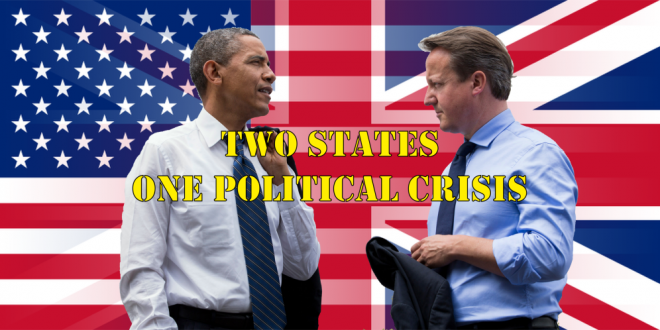 We tend to view events through the personalities of those involved. Is George Osborne a bumbling economic illiterate or an evil genius? Is Iain Duncan Smith a scrounger, a sadist or a full-blown psychopath? Did Labour elect the wrong Miliband?
We tend to view events through the personalities of those involved. Is George Osborne a bumbling economic illiterate or an evil genius? Is Iain Duncan Smith a scrounger, a sadist or a full-blown psychopath? Did Labour elect the wrong Miliband?
In truth, public personas are more often shaped by events and circumstances. Remember how John Major was doomed by Guardian cartoonist Steve Bell’s portrayal of him as a grey wimp who wore his pants outside his trousers. Despite being a tall (over six foot) and charismatic man, Major was unable to shake off this image. Why? Because he, and his hapless Chancellor had presided over economic crises against the backdrop of a Tory party divided upon itself over Europe.
Occasionally in times of profound crisis, history throws up the same personas to act out the same roles. Leon Trotsky in his History of the Russian Revolution saw this in the persona of Charles I of England, Louis XVI of France and Nicholas II of Russia as each faced the collapse of their particular established order:
“The historic-psychological contrast… between the Romanovs and the Capets can, by the way, be aptly extended to the British royal pair of the epoch of the first revolution. Charles I revealed fundamentally the same combination of traits with which memoirists and historians have endowed Louis XVI and Nicholas II.”
The passivity in the face of crisis; the political indecision; military failure; the desperate extraction of income from an increasingly impoverished people; the overbearing foreign wife; and the exalted courtiers giving flawed advice, were there on each occasion, playing their respective roles in leading the regime to the scaffold.
What are the chances of all of these actors being mystically reincarnated time and again to play out the same tragic comedy? None whatsoever – as Trotsky went on to point out – it was the crisis of the regimes in question that brought forward the personas. Even the foreign wives were simply a measure of the crises, as royal marriages were used in an attempt to cement friendly relations with stronger powers. Charles I, Louis XVI and Nicholas II were no more grey impassive wimps than was John Major. They had simply reached the point in the crises of their respective regimes at which any move they made could only hasten the collapse. So they locked themselves behind the gates of their palaces and partied like there was no tomorrow… because, for them, there was no tomorrow.
It is in this light that I wish to draw attention to two recent articles by John Michael Greer – The Suicide of the American Left and The War Against Change – that highlight the staggeringly similar political decay in the USA and the UK. In both articles we can easily substitute the UK for America; the Tories for the GOP; and New Labour for the Democrats. This implies a crisis that goes much deeper than the individual actors who happen from time to time to take centre stage.
Below, I quote extensively from John Michael Greer’s articles to reinforce this point.
Much of the political class in the USA and UK have tended to see 1989 (and the collapse of the Soviet Union) as the point when America emerged as the sole global superpower (Americans dislike the word “empire”). However, as Immanuel Wallerstein has pointed out, the apex of US power came in 1945. The real era of greatness for America came in the 1950s and 1960s – when the USA could still win wars and take time out to put men on the moon. Recession and military defeat in the 1970s served notice that no hegemonic power remains at the top forever. By 1989 the USA was already well into decline (but less so than its Soviet rival). This decline is most obviously observed today in the USA’s (and its ever weaker UK ally’s) inability to impose its will in its various wars and interventions in the Middle East, Asia and most recently Ukraine in the face of a resurgent Russia and a strong China.
The existential regime crisis for both the USA and the UK plays out in the politics of both states. Like doomed emperors before them, the political class and their corporate backers have locked themselves in their palaces as they try to keep their party going. They dare not make fundamental changes because any real change at this point will hasten the coming collapse of the system:
“For the last forty years, mind you, America [and the UK] has been moving steadily along an easily defined trajectory. We’ve moved step by step toward more political and economic inequality, more political corruption, more impoverishment for those outside the narrowing circles of wealth and privilege, more malign neglect toward the national infrastructure, and more environmental disruption, along with a steady decline in literacy and a rolling collapse in public health, among other grim trends.”
Collapse is assured anyway of course. The US-centred global economy is nothing short of a giant Ponzi scheme in which there is now six times more paper “wealth” (in reality non-redeemable claims on future wealth) than there is real wealth to back it up. As the world hits thelimits to resource extraction on a finite planet, sooner or later an economy based on debt-fueled infinite growth must stop functioning. The next banking collapse is no more than a couple of years away (maybe sooner). And this time around the “too big to fail” banks will have become “too big to save”:
“The political consensus in Washington DC [and Westminster] these days can best be characterized as an increasingly frantic attempt, using increasingly risky means, to maintain business as usual for the political class at a time when “business as usual” in any sense of that phrase is long past its pull date. This, in turn, is largely the product of the increasingly bleak corner into which past policies have backed this country, but it’s also in part the result of a massively important but mostly unrecognized turn of events: by and large, neither the contemporary US [and UK] political class nor anyone else with a significant presence in American [British] public life seems to be able to imagine a future that differs in any meaningful way from what we’ve got right now.”
In the political arena the traditional conservative parties (Republican/Tory) have become the radicals – pursuing any and every attack on their own people in an attempt to maintain the privilege of the elite:
“…the Republicans [and the Tories] decided that they’d never met a foreign entanglement or a government handout they didn’t like—unless, of course, the latter benefited the poor. An ever more intrusive and metastatic bureaucratic state funneling trillions to corrupt corporate interests, an economic policy made up primarily of dishonest statistics and money-printing operations, and a monomaniacally interventionist foreign policy.”
As this plays out, the party of the left (Democrat/Labour) has morphed into the conservative party:
“Back when the two parties still stood for something, for example, Democrats in Congress [Labour in Parliament] could be counted on to back organized labor and family farmers against their corporate adversaries and to fight attempts on the part of bankers to get back into the speculation business…
“Nowadays? The Democrats [and Labour] long ago threw their former core constituencies under the bus and ditched the Depression-era [post-1945] legislation that stopped kleptocratic bankers from running the economy into the ground…”
There is no longer an alternative vision of the future, merely an ominous warning about how bad things will get if the other party wins power.
“A movement that defines itself in purely negative terms, though, and attempts solely to prevent someone else’s agenda from being enacted rather than pursuing a concrete agenda of its own, suffers from another massive problem: the best such a movement can hope for is a continuation of the status quo, because the only choice it offers is the one between business as usual and something worse. That’s fine if most people are satisfied with the way things are, and are willing to fling themselves into the struggle for the sake of a set of political, economic, and social arrangements that they consider worth fighting for.”
Does this remind anyone of Ed Miliband’s risible election campaign? Does this not explain why large sections of the working class defected to UKIP and the SNP?
We even find similarities in the political personas that have arisen in both States. The crop of sociopaths and misfits who have come forward as potential Republican presidents seem not dissimilar to the Tory contenders for David Cameron’s job once he has messed up the rashly promised EU renegotiation and referendum. Is it just me or has anyone else noticed the similarities (not just the hair) between Boris Trump and Donald Johnson?
“…no matter how awful a president [prime minister] he’d be, the logic seems to run, at least he’d be different. When a nation reaches that degree of impatience with a status quo no one with access to power is willing to consider changing, an explosion is not far away.”
On the left too, the actors look similar. For Hilary Clinton read Liz Kendall:
“It’s pretty much a foregone conclusion that she’ll lose this campaign the way she lost the 2008 race, and for the same reason: neither she nor her handlers seem to have noticed that she’s got to offer the American [British] people some reason to want to vote for her.”
What about Andy Burnham, Yvette Cooper and the now retired Chuka Umunna:
“I frankly doubt that the other candidates have a single noble motive for seeking office among them, but they have at least realized that they have to go through the motions of having convictions and pursuing policies they think are right. Clinton [Kendall] and her advisers apparently didn’t get that memo, and as a result, she’s not even going through the motions.”
Even Jeremy Corbyn – the surprise front-runner for the Labour leadership – finds a parallel in Senator Bernie Sanders:
“… what makes Sanders’[and Corbyn’s] talking points stand out among those of his rivals is that he isn’t simply talking about maintaining the status quo; his proposals include steps that would restore a few of the elements of the welfare state that have been dismantled over the last four decades. That’s the extent of his radicalism—and of course it speaks reams about the state of the Democratic [Labour] Party more generally that so modest, even timid, a proposal is fielding shrieks of outrage from the political establishment just now.”
Structurally, the UK is in an even worse place than the USA. Whereas the US Dollar still has some international traction as the nominal reserve currency – backed up by the facade of military power –the British pound is backed by nothing more than an increasingly insincere government promise that future taxpayers will somehow find the cash to pay back all of the loans that are currently keeping the UK economy above water. In such circumstances, the doomed austerity policy is the only approach that the political elite can pursue that does not involve their giving up any of their own wealth and privilege.
Nor does the UK enjoy the USA’s still massive (albeit rapidly depleting) mineral and energy resources. The North Sea oil and gas fields peaked in 1999 and have been declining rapidly ever since. What coal and metal reserves Britain might have enjoyed were largely consumed in the building, administering and losing of a global empire (and in fighting two ruinous world wars). Indeed, the UK today even depends upon imported food and medical supplies to keep its people alive. In the (very real and imminent) event of a currency crash, the UK will face the kind of humanitarian crisis that we tend to think of as affecting third world populations.
In the face of this existential crisis, even Jeremy Corbyn/Bernie Sanders are wedded to the increasingly bankrupt 300-year-old economics of infinite growth on a finite planet. And while the kind of reforms they are offering might ameliorate some of the worst effects of our economic decline, and may curb some of the worst excesses of the political/corporate elite, they are at best too little too late for a system whose fall is already upon us.




